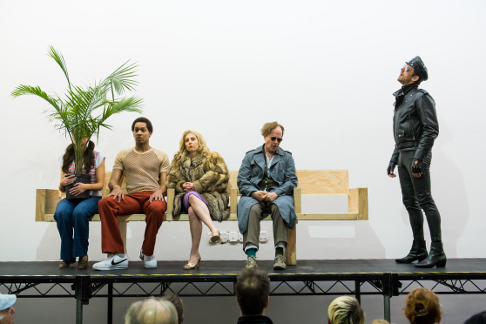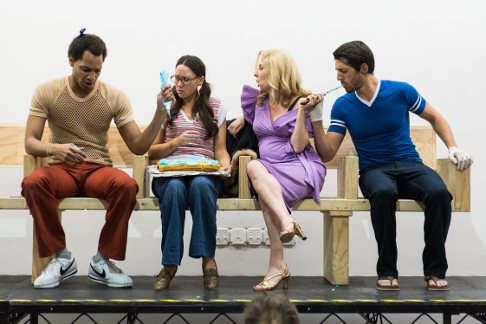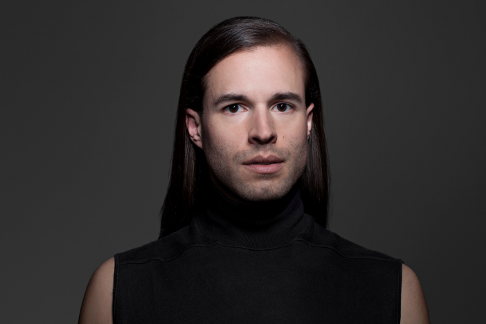04 May 2015
Orlando Explores Art Without Boundaries
R.B. Schlather’s production of Handel’s Orlando asks the enigmatic question: Where do the boundaries of performance art begin, and where do they end?

R.B. Schlather’s production of Handel’s Orlando asks the enigmatic question: Where do the boundaries of performance art begin, and where do they end?
This barebones, stripped-down production had less to do with the performances and more with the process of mounting an opera as an art form in itself. For the weeks leading up to the performances, the rehearsal room was an art exhibition in which curious art-seekers were encouraged to wander in and out of rehearsals, observing the exciting and at times arduous process of preparing an operatic production for an audience.
Upon first glance, the Whitebox Art Center does seem to lend itself as more an exhibition space than a performance venue. With blank white walls and gallery lighting, the only suggestion of a stage was a runway-like platform above the folding chairs that made up the audience seating area. However, the excitement in the room was tangible as R.B. Schlather made a pre-performance announcement welcoming the audience to take photos during the performance, especially if they posted the photos with hashtag “Orlando” on their respective Instagram or Twitter accounts.

Schlather’s production proves how unnecessary a multimillion dollar set budget can be when committed performers take the stage. Geoffrey McDonald conducts with energy and precision, eliciting an authentically Baroque and highly musical performance from an excellent orchestra, with Elliot Figg playing elegantly on the harpsichord. Drew Minter, playing the title role, sings with extraordinary musicality and fine coloratura, while managing to express Orlando’s madness without ever bordering on the cartoonish. Kiera Duffy (Angelica) shines in her second act arias, particularly while expressing her loss of control as her situation grows increasingly dire. Brennan Hall (Medoro) has a full voice with a strong upper register, and sings with heartbreaking sincerity.
The show-stoppers are baritone Hadleigh Adams (Zoroastro) and soprano Anya Matanovic (Dorinda). The audience tingled with excitement every time Hadleigh Adams stepped onstage, whether he was donning a Leather Daddy suit, a Santa costume, or a too-small pair of underwear and nothing else. Adams manages to use his gorgeous instrument with ease and beauty even as he is put under the strains of outlandish costumes or unusual staging. His movement is deft and cat-like, and his sound production never suffers even as he maneuvers the stage with the agility of a seasoned dancer.

Anya Matanovic has an enormously resonant voice that moves with lightness and agility while preserving its fullness. Her sound filled the entire room at all points in her register and during all her movements, even when facing the wall or with her face obscured by a prop. Her aria, “Amore è qual vento” was brilliantly and deftly performed, even as Matanovic pulled off a Sandra Dee-style transformation from innocent shepherdess to a woman empowered by her own sexiness.
This excellent cast offers Schlather the opportunity to employ outlandish, even ridiculous staging and production ideas. This ridiculousness does not detract from the performance; in fact, Schlather manages to play on the conventions of opera very well in a way innovates even while tipping a hat to the traditions of opera seria. He recognizes the inherent sexuality in much of the libretto and music, and works this insight to his advantage. His singers offer unafraid, impassioned performances that speak to Schlather’s ability to demolish the barriers of propriety and politeness that seem to plague much of traditional operatic performance.
 R. B. Schlather [Photo by Matthu Placek]
R. B. Schlather [Photo by Matthu Placek]
At times, this desire to entertain caused certain production choices to distract from crucial musical moments; in particular, the appearance of Zoroastro onstage clad only in a small pair of underwear seemed ill-timed with one of Orlando’s grandest and most complex arias. However, other moments worked very well, such as a poignant moment during Angelica’s second act aria in which Medoro spray paints his lover’s name on the back wall in bright orange spray paint. The name of the game for Schlather is experimentation, and for the most part, his boundary-pushing is inventive and intelligent.
Perhaps the most appealing aspect of Schlather’s Orlando is the opportunity to sit back and enjoy excellent classical music without the fear of boredom or discomfort. The stage manager rollerblades onstage in plain view of the audience to carry out some lighting cues. There’s free wine at the door. During the intermission, audience members can peek into the backstage area as they make their way to the restrooms. Gone is the idea that opera is stuffy or is an art form only enjoyed by a strict code of rules. Instead, Schlather offers an artistic performance that innovates while preserving the highest of musical excellence.
Alexis Rodda